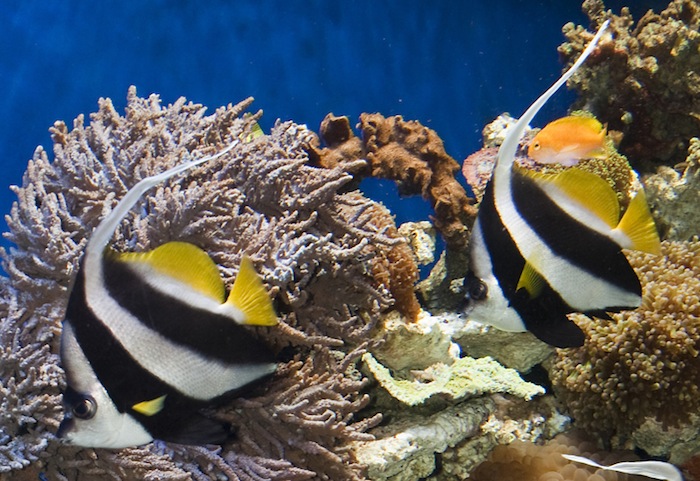Heniochus Reef Safe
It's a question that many reef enthusiasts ask: are Heniochus reef safe? These beautiful fish are popular for their striking appearance and impressive schooling behavior, but concerns about their potential impact on a reef tank ecosystem persist. In this article, we'll explore the topic of Heniochus reef safety and provide insight into how to care for these stunning fish.
Heniochus Reef Safe: Pain Points
Heniochus fish can be a tricky addition to a reef tank, as they have been known to nip at coral and other invertebrates. Their diet also tends to include small crustaceans, which can be harmful to other tank inhabitants such as shrimp and crabs. Additionally, Heniochus fish have been known to grow quite large, which can make them unsuitable for smaller tanks.
Target of Heniochus Reef Safe
If you're thinking about adding a Heniochus fish to your reef tank, it's essential to consider the potential impact on your tank's ecosystem carefully. While Heniochus fish are undoubtedly stunning, their behavior and dietary needs make them unsuitable for some reef tanks. However, with proper care and consideration, these fish can make excellent additions to larger reef tanks.
Summary of Main Points
In summary, Heniochus reef safety is a complex topic that requires careful consideration. These fish are known for their striking appearance and impressive schooling behavior, but they can pose problems for a reef tank ecosystem. Ensuring that your tank is large enough to accommodate a school of Heniochus fish and providing appropriate dietary options can help to minimize any risks associating with their care.
My Personal Experience with Heniochus Reef Safe
I have kept Heniochus fish in my reef tank for several years, and I have had mixed results with their care. While the fish are undoubtedly stunning and create an incredible visual display when schooling, I have had issues with their dietary requirements. Heniochus fish tend to prefer live food options such as brine shrimp and mysis shrimp, which can be a hassle to manage and require a lot of time and effort. However, with patience and persistence, I have been able to provide them with a balanced and healthy diet that encourages their growth and wellbeing.
Heniochus Reef Safe Diet and Care
When it comes to caring for Heniochus fish, it's essential to consider their dietary needs carefully. These fish require a varied diet that includes both meaty and vegetable-based foods. In addition to live and frozen options such as brine shrimp and mysis shrimp, they can also be fed algae-based diets and other vegetable matter such as spirulina. Their care also requires a large enough tank to accommodate their schooling behavior and to prevent aggression towards other tank inhabitants.

Heniochus Reef Safe Habitat
Creating an appropriate habitat for Heniochus fish is essential for their health and wellbeing. In addition to providing a large enough tank, they also require plenty of hiding places such as live rock and coral formations. Ensuring that the tank's water quality is high is also crucial, as these fish are sensitive to changes in pH and other water parameters.
Heniochus Reef Safe Compatibility
When considering adding Heniochus fish to a reef tank, it's important to consider their compatibility with other tank inhabitants. These fish can be aggressive towards other fish and invertebrates, so they are best kept with larger, more robust tank mates. Additionally, Heniochus fish are known to create a lot of waste, so it's important to ensure adequate filtration is in place to maintain water quality.
Question and Answer
Q: Are Heniochus fish reef safe?
A: Heniochus fish can be reef safe, but it's essential to consider their dietary and behavioral needs carefully before adding them to a tank.
Q: What do Heniochus fish eat?
A: Heniochus fish require a varied diet that includes meaty and vegetable-based foods such as brine shrimp, mysis shrimp, and spirulina.
Q: What size tank do Heniochus fish need?
A: Heniochus fish require a large tank to accommodate their schooling behavior and to prevent aggression towards other tank inhabitants.
Q: What kind of tank mates are best for Heniochus fish?
A: Heniochus fish are best kept with larger, more robust tank mates that can withstand their aggressive behavior.
Conclusion of Heniochus Reef Safe
In conclusion, Heniochus reef safety is a complex topic that requires careful consideration. While these fish can be stunning additions to larger reef tanks, their dietary and behavioral needs make them unsuitable for some aquariums. By providing adequate care and attention to their needs, however, Heniochus fish can thrive in a well-maintained reef tank environment.
Gallery
Schooling Bannerfish (Heniochus Diphreutes) In Aquarium

Photo Credit by: bing.com / heniochus bannerfish schooling reef kasper nordic source
Heniochus Diphreutes - Schooling Bannerfish | ReefLifeSurvey.com

Photo Credit by: bing.com / heniochus reeflifesurvey chrysostomus intermedius species stuart rick smith
Reef Safe Butterflyfishes?

Photo Credit by: bing.com / reef safe heniochus schooling bannerfish butterflyfishes reefs charles
Heniochus Diphreutes...how Many? - Reef Central Online Community
Photo Credit by: bing.com / heniochus acuminatus tail fin caudal notice rear
Pennant Coralfish (Heniochus Acuminatus) In Aquarium

Photo Credit by: bing.com / heniochus acuminatus pennant coralfish jeune individu file wikimedia commons